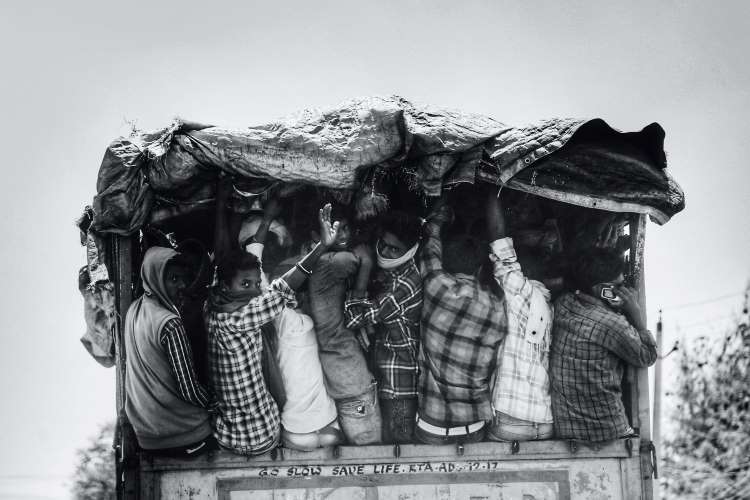
Working class population across the world suffered heavily from the lockdown and containment measures taken to check the spread of the Covid-19 pandemic. Economic recovery under such circumstances is subject to adoption of appropriate policies. Latest data from the ILO confirm that labour markets around the world were disrupted massively in 2020 on an unprecedented scale as a fallout of economic disruption caused by Covid-19 pandemic. The impact was severe on the working class across the globe.
The share of workers living in countries with Covid related restrictions has remained high. Around 93% of the world’s workers resided in countries with some form of restrictive measures in place at the beginning of 2021. After the second wave of the pandemic, more regionally targeted and sector-specific measures have become the norm. In 2020, 8.8% of global work hours were lost compared with the fourth quarter of 2019. This is equivalent to 255 million full-time jobs. Work-hour losses in 2020 were approximately four times greater compared with the global financial crisis in 2009.
READ I Out of coverage: Labour Codes must ensure basic rights to gig and platform workers
Globally, the fall in work hours in 2020 translated into both employment losses and a reduction in working hours for those who remained employed with significant variation across regions. Overall, there were unprecedented global employment losses in 2020 — 114 million jobs lost compared with 2019. In relative terms, employment losses were higher for women (5%) than for men, and for young workers (8.7%) than for older workers.
Labour market facing uncertainty
Employment losses in 2020 translated mainly into rising inactivity rather than unemployment. Global labour income (before considering income support measures) in 2020 is estimated to have declined by 8.3%, which amounts to $3.7 trillion or 4.4% of the global gross domestic product (GDP). There are expectations that a robust economic recovery will occur in the second half of 2021 with Covid-19 vaccination covering more people. The global economy is still facing high levels of uncertainty and there is an apprehension that the recovery will be uneven. The latest projections indicate a persistent work deficit in 2021.
Drawing on International Monetary Fund’s (IMF) economic forecast from October 2020, the baseline scenario projects a continued loss in work hours of 3% in 2021 compared with the fourth quarter of 2019. This corresponds to 90 million full-time equivalent jobs. In the worst possible scenario, working-hour losses in 2021 will remain at 4.6% or 130 million jobs, relative to the fourth quarter of 2019. In the best possible scenario, a loss of 1.3% per cent of global work hours (or 36 million jobs) is still expected in 2021 relative to the fourth quarter of 2019.
READ I Labour reforms: What do the four labour codes mean to businesses, workers
The latest labour force survey data reveal the contrast between massive job losses in hard-hit sectors (such as hotel and food services, arts and culture, retail and construction) and the positive job growth evident in a number of high-skilled services sectors (such as information and communication, and financial and insurance activities). This divergence will tend to increase inequality within countries. At the same time, there is considerable variation across countries with regard to the severity of the impact of the crisis on jobs in the hardest-hit sectors.
Crisis in jobs, incomes
Similarly, evidence from available data shows that the impact of the crisis on ‘post-support labour income’ (implies the income support received by workers) was uneven across different parts of the workforce, although income support measures have mitigated the impact. Overall, losses in post-support labour income were relatively larger for young workers, women, self-employed, and low- and medium-skilled workers. In most of the cases, job destruction has disproportionately affected low-paid and low skilled jobs. All this points to the risk of an uneven recovery, leading to still greater inequality in the coming years.
At the beginning 2021, the world was still experiencing an unprecedented crisis in jobs and incomes and heightened levels of uncertainty. Over the year, policy responses will need to combine the rollout of vaccination, public health measures, and supporting measures for the economy and the labour market. Policymakers should strive to support a recovery that is robust and broad-based, focusing on employment, income, workers’ rights and social dialogue.
To that end, policymakers need to suggest an accommodative macroeconomic policy that will provide income support for the vulnerable sections of the population and encourage investment. Developed countries should provide economic assistance to the low- and middle-income countries with regards to vaccination and policy measures. Further, to get over depression like economic environment, availability of money in the hands of the working-class population should be ensured by the monetary authority of respective countries. Demand side restoration is much more important than supply side push in the present economic outlook.
It must be ensured that vulnerable groups such as young people, women, the low-paid and low-skilled informal sector workers are supported in finding decent work opportunities and that they do not suffer any long-term deliberating effects. It is balancing the needs of the diverging sectors which should be prioritised with effective policy measures to support workers’ labour market transitions. Policy-makers should identify recovery strategies based on social dialogue that promote a transition to a more inclusive, resilient and sustainable world of work.
Dr Kingshuk Sarkar is an associate professor at the Goa Institute of Management. He has worked as a labour administrator with the government of West Bengal. He earlier served as a faculty member at VV Giri National Labour Institute, Noida and NIRD, Hyderabad. Views expressed are personal.


